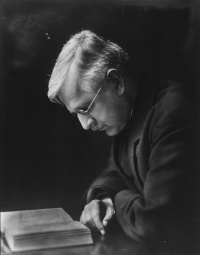Graham Wallas
Jump to navigation
Jump to search
According to the Spartacus educational website:
- In 1884 Wallas joined the Fabian Society. He soon emerged as one of the three leaders of the group, or as George Bernard Shaw put it, "one of the Three Musketeers". With the support of the Fabians Graham Wallas was elected to the London School Board in 1894 and chaired its School Management Committee. In 1894 Wallas was elected to the London County Council where he became a member of the Education Committee.
- When Sidney Webb and Beatrice Webb established the London School of Economics (LSE) in 1895, they asked Wallas to become its first director. Wallas declined the offer but did agree to teach at the LSE and eventually became professor of politics (1914-23).
- Wallas argued for the humanizing of modern life and believed that educators should pay more attention to human beings than institutions. Wallas wrote several books on social psychology and politics including Human Nature in Politics (1908), The Great Society (1914), Our Social Heritage (1921) and the Art of Thought (1926). Graham Wallas died in 1932.[1]
Theorist of propaganda managed society
According to David Miller and William Dinan[2] :
- In the UK the threat of democracy was a pressing concern to the business, political and intellectual classes. The intellectual case was advanced by figures formerly associated with the reformist left. The foremost thinkers in this area then included Walter Lippmann, a young student member of the Socialist Party in 1910 when he first met the British academic Graham Wallas, himself a former Fabian. Wallas published a book in 1908 that gave renewed currency to the age-old notion that the ignorance of the general public meant that democracy was impossible. Wallas was a significant modern theorist of the democratic incompetence of the masses whose legacy to ideas of a 'propaganda managed democracy' is largely forgotten.
- Wallas argued in Human Nature in Politics that 'human intellectual limitations' created the possibility of the 'manipulation of the popular impulse' and therefore that the realisation of popular democracy was difficult, if not impossible.[3] Wallas propounded the view that democracy should avoid 'those questions… which cause the holders of wealth and industrial power to make full use of their opportunities.’ If they did so, 'the art of using skill for the production of emotion and opinion has so advanced, that the whole condition of contests would be changed for the future.’[4] This work profoundly influenced Lippmann who was exposed to these ideas when Wallas lectured in the US in 1910. Lippmann is widely recognised today as an important intellectual progenitor of the theory and justification of propaganda managed democracy. But Wallas' contribution is acknowledged less often. There is little awareness that the concerted movement to, as Alex Carey memorably put it, 'take the risk out of democracy' also happened in Britain.[5]
- When Wallas travelled to the US to lecture at Harvard in 1910 he met Lippman and they became firm friends. Lippmann acknowledges his debt to Wallas, 'the man who diverted me more than anyone else' away from socialism.[6] Wallas was clearly impressed by the young Lippmann and dedicated his next book, The Great Society (first published in 1914) to him.[7]
Publications
Notes
- ↑ Spartacus Educational Graham Wallas, accessed 8 October 2008
- ↑ David Miller and William Dinan (2008) A Century of Spin - How Public Relations Became the Cutting Edge of Corporate Power, London: Pluto Press, p. 37-8
- ↑ Cited in Terence H. Qualter, Graham Wallas and the Great Society, New York: St Martin's Press, 1979, p. 134.
- ↑ Graham Wallas, Human Nature in Politics, Lincoln: University of Nebraska Press, 1962 (original 1908), p. 29.
- ↑ Alex Carey Taking the Risk Out of Democracy: Corporate Propaganda Versus Freedom and Liberty Sydney: University of New South Wales Press, 1995.
- ↑ Ronald Steel, Walter Lippmann and the American Century, New York: Vintage Books, 1980, p.28.
- ↑ Graham Wallas, The Great Society: A Psychological Analysis, New York: Macmillan Company, 1914.
